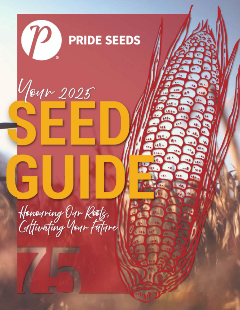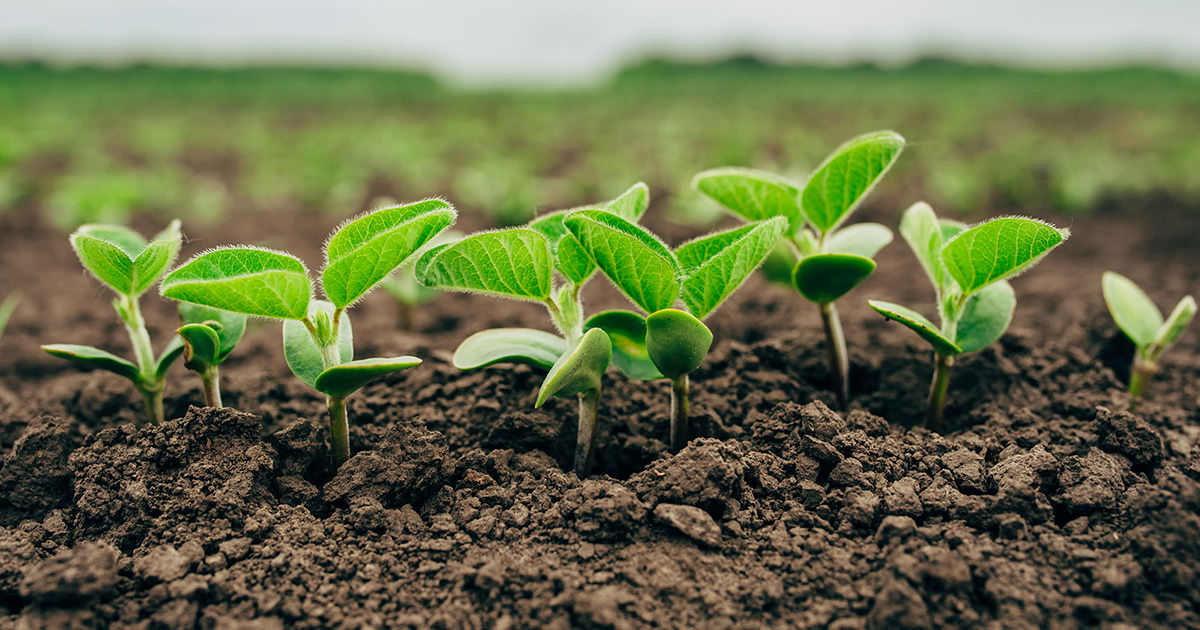Browse our selection of products below
___________________________________________________________________________________________________________________________________________

2024-2025 PRIDE Seeds Product GuideYou can find all of our products on the website, including supporting performance data and create your own personalized guide called My Guide. You can also download the digital version of our printed product guide which includes product comparison charts. |
Enhance your knowledge and stay ahead with PRIDE SEEDS Corn and Soybean School videos.
SHOP THE PRIDE SEEDS E-STORE
-7.png?sfvrsn=87920db3_3)
STAY UP-TO-DATE WITH PRIDE SEEDS LATEST BLOGS, NEWS AND ARTICLES
Planting Soybeans Early

The past couple of growing seasons there has been a lot of discussion around planting soybeans early, in fact before corn acres. Depending on crop rotation, fall tillage, and acreage, there may be perceived constraints to some growers being able to do so, however, there are several reasons why it should be considered.
- Soybeans are photoperiod sensitive (dependent on hours of light) Early planting= more days to develop height and nodes, prior to triggered (post-summer solstice) reproductive growth.
- Soybeans can withstand cool soil conditions
- Soybeans can ‘Flex’ to compensate for lower plant populations
- Stress at planting is less detrimental to yield potential than corn.
- Faster canopy closure, for better weed suppression(best results with 2pass herbicide program)
Photoperiod - Soybeans are resilient little plants that once out of the ground can put out a new trifoliate every 5-7 days, this rate even more accelerating after V5 when we typically get into hot growing conditions. Consider having a bean emerged prior to May 30th with the ability to be flowering 1-2 weeks early and possibly flowering ahead of hot dry periods, which can cause flower abortion. Data from Wisconsin (https://coolbean.info/2019/04/10/planting-date-and-maturity-group-considerations-moving-into-a-potentially-early-spring-2018/) represented on average soybeans planted on May 1 vs. June 1 spent 60 days vs. 45 days in Reproductive stages R1- R6. Therefore extending flowering and potential for higher yields. Planting early has a greater risk of stand loss, but ‘Plasticity’ or ability to ‘Flex’ of a bean can offset this:
If the final stand was 130,000 plants/ac and we could maintain 1 x 2bean pods per plant. Yield potential is 1.7bu/ac greater.
(2500 seeds/lb. x 60lbs/bu= 150,000seeds/bu. (130,000 plants x 2 beans/plant= 260,000 extra seeds/ 150,000 per bu. = 1.7bu/ac)
(plants/acre X 1000)*
| Planting date | Temp. at planting (C) | Coldest within 12 hours (C) | Plant stand (pl/ac) | Yield (bu.ac) |
| April 22 | 3 | -4 | 134 | 64.1 |
| April 25 | 13 | 0 | 148 | 63.4* |
| April 27 | 15 | 0 | 142 | 62.4 |
| May 22 | 23 | 10 | 135 | 66.3 |
| June 10 | 30 | 13 | 159 | 50.8 |
*No-till soybean planted in 15" rows @ 175,000 seeds/ac @ 1.5" depth
Source: Dr. Hooker/ H.Bohner:Omafra 2021 OagConf
The above chart demonstrates cold tolerance of seed, to emerged stand and the final yield results by planting date. Data collected from OMAFRA soybean trials.
Despite withstanding sub -4’C soil temperatures soybean stand loss was just over 20% which proved to be some of the highest yielding. We can typically experience 20-30% losses from soil crusting on clay in June when stand is the crucial element to achieve as many nodes per acre fast.
**To realize maximum yield potential a bean would have developed 5-8 nodes/plant, prior to Flowering (R1 growth stage).
Multi-year data from both OMAFRA (H.Bohner) and Wisconsin (Badger Bean) has demonstrated Full season varieties are one of the most important to maximizing the early planting dates. Not until we get into June plantings can a 0.5MG reduction provide more optimal yields.
Soybean Yield at Various Planting Dates
(2020 Bornholm)
| Planted April 22 | Planted May 22 | Planted June 10 | |
| 1.0 RM variety (2775 CHU) | 64.1 | 66.3 | 50.8 |
| 0.5 RM variety (2650 CHU) | 57.2 | 62.5 | 57.4 |
Longer relative maturity (RM) variety yielded more when planted early.
Shorter relative maturity (RM) variety yielded more when planted late.
Source: Dr. Hooker/ H.Bohner:Omafra 2021 OagConf
Ability to ‘Flex’: in 2019 We demonstrated how soybean varieties can respond to lower plant populations and yield economical returns. Regardless of variety, with very good soil planting conditions, good fertility, and early planting dates.
This chart was developed from a PRIDE plot site on loam soil and 24” row widths. Varieties that tend to be tall/bushy performed well at lower populations, rather than do those that are more slender and tall. All demonstrated additional branching and higher node counts.
Pictured: PS2444XRN at 80,000ppa(L) vs. 120,000ppa(R)
A stressed corn plant that is 2 leaf collars behind its neighbour can immediately result in 5bu yield losses. This is not necessarily the case in soybeans.
Key points
- Plant early to maximize nodes per acre.
- Plant full-season varieties 1st.
- Planting at 1.5” depth yields the most consistent stand establishment
- Target tilled soils for quicker soil warmup, and more consistent soil moisture, rather than no-till.
- Soybean seeds can withstand cold air temps, but avoid planting ahead of freezing temps. Look for soil temps reaching 8-10C before planting.
- Very Good soil fertility levels and planting conditions are keys to success.
| Table 1: Effect of Planting Date on Yield | ||
| Planting Date | Yield* (bu/acre) | Percent of Full Yield |
| April 15 – May 5 | 63.8 | 100 |
| May 6 – 20 | 63.3 | 99 |
| May 21 – June 5 | 58.5 | 92 |
*Average of 22 trials across Ontario from 2010 – 2012, OMAFRA, U of G,
If you have any questions about this article, please contact your PRIDE Seeds Agronomist.
Resources:
https://crops.extension.iastate.edu/soybean-plant-population
https://www.gosoy.ca/mat_groups.php
https://badgerbean.com/resources/potentially-early-spring-planting-date-maturity-groups-factors/
https://coolbean.info/2019/04/10/planting-date-and-maturity-group-considerations-moving-into-a-potentially-early-spring-2018/
TAKE PRIDE IN YOUR INBOX
Expert advice, news and information
THE PRIDE SEEDS ADVANTAGE
Farming is one of the most demanding industries in the world, subject to a variety of factors such as time, weather, and global pressures. You know this every time you look out the window and think about the field in front of you. Growers and dealers deserve an advantage: The PRIDE Seed Advantage.
LEARN MORETHE PRIDE SEEDS ADVANTAGE
Every year PRIDE Seeds works hard to produce leading-edge products that enable success where it matters most, on your farm. Our dedicated team strives to provide sales expertise, agronomy support, quality production, and service tailored to meet your needs.
LEARN MORE

Leave a commentOrder by
Newest on top Oldest on top